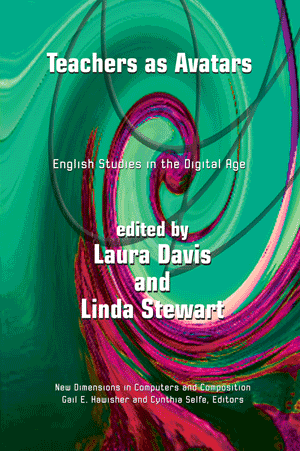Teachers as Avatars: English Studies in the Digital Age (Linda Stewart and Laura R. Davis) | |
|  | Quantity in Basket:none
Code: 978-1-61289-023-4
Price:$29.95
Title: Teachers as Avatars
Sub-title: English Studies in the Digital Age
Editor(s): Linda Stewart and Laura R. Davis
Publish Date: June 2011
Pages: 300
Format: Paper
| |
| This book acknowledges the dynamic nature of teacher identity and its correlation to student learning. In this boundary-crossing collection, teachers of rhetoric and composition, literature, professional and creative writing, and English Education describe their successes and successful failures with digitally mediated pedagogy. Grounded in theory-based practices, this volume will be useful to practitioners across the range of English Studies and beyond. Readers will find ways to reconsider interactions between themselves and their students, to find ways to adapt their curricula or programs, and to think about larger disciplinary discourses regarding teaching with technology.
The contributors describe their encounters with teaching and learning technology in local and global settings. Their chapters address access, resistance, intercultural competence, ethics, assessment, multimodalities, power relations, and identity. This broad range is versatile enough for those seeking a common reader for faculty learning communities, a textbook for pedagogy courses, or a classroom resource. Provocative and practical, the book chronicles how educators and students are becoming avatars of learning in this digital age.
Contents: We. Avatars. An Open Letter from the Editors. Foreword, Lynée Lewis Gaillet. PIONEERING TECHNOLOGY. Riding the Waves of Technology with Dramamine, Donald J. Fay. Digital Literacy and First Year Writing: Strategies for Rethinking Reading and Writing, Letizia Guglielmo. Rethinking Our Digital/Disciplinary Home: How Training in Rhetoric and Literacy Analysis Can Lead to Successful Online Teaching and Why Teachers of English Studies Should Care About Online Learning, Laura R. Davis. ACCESSING TECHNOLOGY. Digital Distopias, Digital Dreams: Impassioned Encounters with Electronic Communication in Tunisia , Gunnar Liestøl. New Dimensions: Equipping Students, Ruth Goldfine. Visions of Star Trek: Technology Working for Students with Disabilities in College Writing Programs, Ellen Taber. READING AND RESISTING TECHNOLOGY. Digesting Dickens: Serial Reading of Little Dorrit in an Online Community, Katarina Gephardt. To E-Read or Not to E-Read: Rethinking Resistance to Digital Texts in the Literature Classroom, Andrew Morrison, Idunn Sem, and Martin Havnør. Twenty-First Century Commercial Texts in the Classroom: Exploring Online Selling, Manipulation, and Subterfuge, Andrew Deacon, Andrew Morrison, and Jane Stadler. DESIGNING NEW MEDIA. Redefining Literate Space: Using Weblogs in Composition Courses, Michael Keleher. Digital Storytelling: The Story of Students’ Literacy Responses and Pedagogical Approaches, Jennifer Dail. Digital Media and Documentary Filmmaking: A Brave New Odyssey for the Composition Classroom, Khalil Elayan. REDEFINING IDENTITIES. Teaching with Technology: A Shared Learning Experience, Yvonne Wichman. Writing Identities: Implementing Online Journaling in the Composition Classroom, Jenny Sadre-Orafai. Measuring Up: The Uncertainty of Assessing New Media, Linda Stewart. Remediating Professionalization: Twenty-First Century English Studies, Adrienne P. Lamberti. Afterword, Laura McGrath. About the Contributors. Author Index. Subject Index.
|
| |







